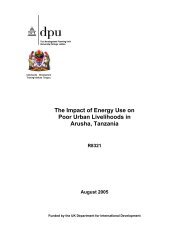EPA Review Annex Documents - DFID
EPA Review Annex Documents - DFID
EPA Review Annex Documents - DFID
You also want an ePaper? Increase the reach of your titles
YUMPU automatically turns print PDFs into web optimized ePapers that Google loves.
ensure that they have foreknowledge of issues by the time Federal Executive Council Memos<br />
are prepared by the Ministry of Commerce and Industry for discussions at the Federal Executive<br />
Council Meetings. The BMOs role is strictly interest-related. They are in the Committee to<br />
always ensure that the interests of their members are considered in any decision and, where<br />
there is lack of understanding, to insist on technical studies to illuminate such lack of clarity of<br />
issues.<br />
The Ministry’s Department of Trade has 211 members of staff on its nominal roll. The <strong>EPA</strong><br />
negotiating team has only eight of these officials, six of whom have basic degrees in social<br />
sciences and business administration and two of whom has additional degree in Law and one a<br />
higher degree in political science. None has an economics degree 107 but all have been exposed<br />
to different on-the-job training through short trade policy related workshops within and outside<br />
the country, with some at the level of the WTO through the regional trade policy course mounted<br />
for 3 months per year. The desk officer for <strong>EPA</strong>, an Assistant Chief Commercial Officer in the<br />
Intra-Africa section, attended this training course in Nairobi in 2005. In view of the structure of<br />
staff in the different sections, while the negotiations last, it appears that more staff is required to<br />
be involved in the negotiation of the <strong>EPA</strong> either through new employment or through temporary<br />
redistribution of existing staff from the Trade Promotion and WTO sections, which is the more<br />
feasible option.<br />
More detail of the Intra-Africa section which deal with the <strong>EPA</strong> negotiations is provided on Table<br />
3. The average salary range of the members of staff of the Intra-Africa unit is between grade<br />
levels seven and 13 while the departmental head who directs activities in the Trade department<br />
is on grade level 17 and his deputy on grade level 16 (see Appendix Table 1). The <strong>EPA</strong> team<br />
does not yet have an external adviser on the <strong>EPA</strong> negotiations, while it has four external<br />
national consultants who do not receive any compensation except when they are involved in<br />
conducting <strong>EPA</strong>-related studies that are paid for by donor organisations, mainly by <strong>DFID</strong> Nigeria<br />
and to a little extent the ECOWAS Commission. Their travel costs and per diems are also<br />
reimbursed by these organisations.<br />
The part of the Ministry’s budget spent on trade negotiations is a more challenging task because<br />
negotiations involved capacity building, workshops, carrying out negotiations related studies,<br />
travels for actual negotiations and staying over in either Brussels, Geneva or any of the West<br />
African countries that the <strong>EPA</strong> negotiation meeting would be taking place. All of these details<br />
are not shown in the budget apart from a lump sum that makes reference to <strong>EPA</strong> negotiations.<br />
The only year that a budget head was designed for <strong>EPA</strong> negotiation was in 2008 when the<br />
negotiations gathered momentum. The <strong>EPA</strong> budget for 2008 was N200million but only N3million<br />
(or about $20,000), representing 1.5% of allocation, was released and spent, this was induced<br />
by the falling oil prices which ensured that budget performance fell well below expectation in<br />
that year. This amount is clearly too little even for travelling of three experts only once.<br />
Aid programmes and technical assistance programmes directed at the members of staff of the<br />
Department of Trade relate to capacity building with regard to both the WTO and the <strong>EPA</strong><br />
negotiations. Table 4 indicates for those who responded in the WTO and Intra-Africa units the<br />
types of training that have been attended and the sponsors. 108<br />
107 The head of the department is an economics graduate.<br />
108 The sample includes four officers in WTO unit and five officers in Intra-Africa unit. It was a difficult task<br />
convincing respondent officers that this census of capacity building programmes was not meant to<br />
redistribute the opportunity to attend, this suspicion pointing to uneven distribution of capacity<br />
programmes among staff.<br />
125
















